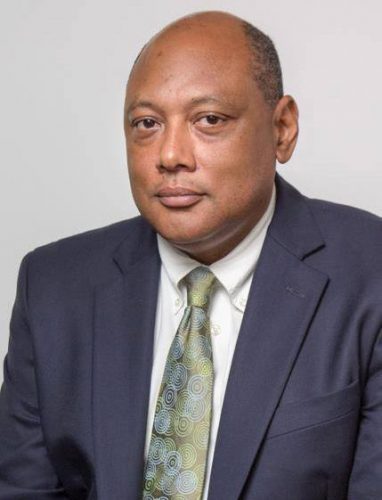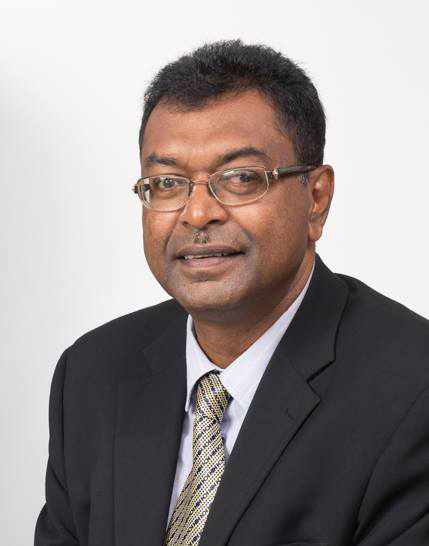Saying that the Caribbean Court of Justice (CCJ) cannot direct the executive branch of government but can only make appeals through consequential orders, Alliance For Change (AFC) Leader Khemraj Ramjattan yesterday insisted that stating a date for Guyana’s next general elections is outside of the court’s ambit.
“Judges cannot pronounce on the elections date. Judges cannot pronounce on a number of matters that the constitution provides constitutional agencies [the power] to make the determination of, like GECOM [the Guyana Elections Commission], on whether the list is right to go to an election. All of those things are outside of the arena and parameters of the CCJ, or any judge for that matter, and so I believe there is going to be a consequential order that will not seek any overreaching and especially entering the political realm or executive realm. It will not,” Ramjattan said.
He made these comments at an AFC press conference, during which AFC Chairman Raphael Trotman also adopted a similar position.
Responding to questions about the consequential orders which are expected to be made by the court today, Ramjattan, who is Public Security Minister, said that “there can be exhortations from its consequential orders and I think that is probably as far as they can go.”
After ruling on the no-confidence case on June 18th, the CCJ gave all parties to the proceedings the opportunity to submit the consequential orders they would like to see made and set today for its decision.
Ramjattan told reporters that the coalition government will regard the consequential orders made by the court as orders that must be abided by and adhered to. “We will so do as best as possible in the circumstances. We will do everything to ensure that those consequential orders are realised,” he said.
At this point, Trotman interjected to remind all of the Esther Perreira v the Chief Election Officer elections petition case. He said that the then judge ruled that the 1997 elections were null and void but went on to make consequential orders. “I think that will be a good guide, both for the nation and the CCJ, into what was appropriate and what was inappropriate insofar as overreaching is concerned,” he said.
“Yes, you are going into an election but the courts will set the parameters but the court couldn’t dictate to the then president to tell her what she should do and when she should do it,” he added.

Trotman said that what the court could say is that elections must be held by a certain date. “At the end of the day, the constitutional provisions as to the powers of the president, what he can and cannot do, are preserved. And the court, we doubt, as lawyers, would want to dictate to a president and to a country certain things,” he further said.
Trotman reminded that despite the pending final outcome of this matter, which has engaged the attention of the judiciary since January, the country still has to be governed and public servants still have to be paid. “The law is not an ass and… the court will draw precedents from around the world and Guyana has already provided a precedent as to what can and cannot happen in the days ahead,” he added.
He opined that what the court is now faced with is giving meaning to what is intended by the framers of the constitution without making the country “ungovernable.” He said that one has to “walk a thin line between respecting the constitution and ensuring that you don’t plunge the place into some state of chaos where there is no identifiable order or person or persons in charge,” he stressed before making mention of Articles 106 (6) and 106 (7).
“I think the court has to assist us as a part of that constitutional reform process. We tried in a very short timeframe, coming out of [the] Herdmanston Accord. It was said that we must have both constitutional reform and elections within three years,” he said.
He explained that given the rush to get legislation passed, government ran out of time to get things done.
Credible elections
Trotman used the occasion to assure that credible elections will be held by year end.
“We would like every citizen of Guyana to have not just elections but importantly credible elections and we expect those will and should be held before of this year,” he said during his opening statement.
Stressing that only the president can issue a proclamation announcing an election and naming a date for those elections, he said that there are some consequential things that have to be done in such a case, including the dissolving of Parliament and fixing of a date for nomination.
He said the AFC expects that the proclamation of an elections’ date will and should only be given based on “advice provided by the GECOM. That has always been the practice since our independence…that they are ready for the holding of an election.”
Trotman added that appointing a Chairman is critical to the issues he raised. “Unless the commission is constituted and quorate, constituted meaning that it has a Chairman and quorate meaning that the members who have been named and appointed to serve are present… we may find ourselves in trouble,” he said, while adding that Ramjattan and his team are working assiduously to bring this matter to finality.
He noted that the AFC had previously said this matter could and should be wrapped up within three weeks given the consensual approach that the CCJ had recommended. “We believe that within a matter of days we should have an acceptable list and an appointment can be made
within the terms of the CCJ decision. It is the party’s desire and perhaps even mandate, given to Mr. Ramjattan, that this matter be concluded before the end of the week, so, hopefully, we can report it to the CCJ tomorrow (today) that we have done it. We have instructed Ramjattan… that by this weekend the nation should know that there is a list…,” he added.
Ramjattan is one of the representatives tasked by President David Granger with meeting with an opposition team to discuss nominations for the GECOM Chairperson. Both sides have already exchanged lists with their choices.
Ramjattan told reporters that the AFC’s position is that there must be good faith between the two sides, with the aim of amicably resolving this situation.
“We are, in good faith, going to comply with the constitution and the interpretation of the CCJ ruling. We are also going to ensure that the selection process is consensual in accordance with the CCJ ruling … [this] means an incorporation of a meaningful input from the president’s side,” he said.
According to Ramjattan, the party is aware of challenges and hiccups that can arise in such a process but will continue the engagement until finality is reached in good faith and he added that it is expected that the opposition will adopt a similar attitude.
Responding to questions afterward, he said that there is no actual timeframe for the presentation of the list of the opposition leader’s nominees to the president. He explained that the instruction given to his team by the president is to “engage, hammer out to find six names not unacceptable…with the other team…within as short a time as possible….”
He said he doesn’t see any merit in the statement being made by the opposition that the team is not there on behalf of the president. “We are and that is the hammering out process. The hammering out process means exactly that. We are there to hammer out, sort out, an approach and all of that and that is what we have done,” he added.
Pressed for more details on what the committee is looking for in the six nominees that will be presented to the president, Ramjattan said the qualities are in keeping with the eligibility requirements outlined in the constitution, which includes those who are eligible to be judges and being fit and proper.
He confirmed that the president did consult the AFC on the names he put forward to the opposition. He and the others at the head table stated that they did not object to the names of two PNCR members being included in the president’s list. “We suggested names, everyone suggested names. Yes, it was a collaborative efforts,” AFC General Secretary David Patterson said.
When pressed, Ramjattan and Trotman were adamant that the AFC’s suggestions were reflected in the president’s list of names. Trotman added that on the list of 18 names originally nominated by Opposition Leader Bharrat Jagdeo were persons who were members of the PPP but there was no “public outcry and outrage.”


